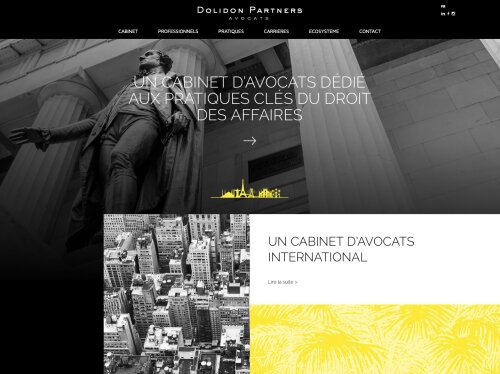Best Project Finance Lawyers in Paris
Share your needs with us, get contacted by law firms.
Free. Takes 2 min.
List of the best lawyers in Paris, France
About Project Finance Law in Paris, France
Project finance is a method of funding large-scale infrastructure and industrial projects, such as energy plants, transport networks, or telecommunications systems. In Paris, France, project finance transactions are common for both public and private sector projects, typically structured as long-term arrangements involving multiple parties, such as sponsors, lenders, contractors, and government entities. French law and European Union regulations play a significant role in shaping the framework for project finance in Paris. These transactions often require complex legal documentation and careful risk allocation to ensure projects are completed on time and within budget.
Why You May Need a Lawyer
Seeking legal advice for project finance in Paris, France, can be essential in various situations. Lawyers experienced in this field can help:
- Draft and negotiate complex loan agreements or financing documents
- Assess and allocate risks among stakeholders
- Navigate regulatory requirements and compliance with French and EU laws
- Advise on public-private partnerships and concessions
- Resolve disputes arising out of construction, operation, or financing of projects
- Secure permits and deal with environmental regulations
- Manage cross-border aspects involving international investors or contractors
- Understand tax implications of the financing structure
- Assist in refinancing or restructuring existing projects
When dealing with high-value and high-risk ventures, the expertise of a specialized lawyer can protect your interests at every stage of the project lifecycle.
Local Laws Overview
Project finance transactions in Paris are subject to a combination of French civil law, commercial law, environmental regulations, and European Union directives. Key aspects of local law relevant to project finance include:
- Contract Law: French law emphasizes the binding nature of contracts, making the negotiation stage crucial for risk management.
- Security Rights: Securing loans with appropriate collateral, such as mortgages or pledges, must comply with French requirements for validity and enforcement.
- Public-Private Partnerships (PPPs): French law outlines how public bodies and private companies can collaborate, including procurement, transparency, and competition rules.
- Permitting and Land Use: Authorities in Paris require several permits for project development, such as building permits and environmental authorizations.
- Environmental Regulations: France applies strict environmental assessment and compliance rules, which must be factored into project planning and finance structures.
- Tax Law: The structure of project finance deals in Paris may have tax implications regarding VAT, corporate taxation, and cross-border payments.
- Dispute Resolution: French courts and arbitration tribunals can have jurisdiction over disputes, with many contracts also allowing for international arbitration.
It is vital to work with professionals who are familiar with the legal intricacies of project finance in Paris to anticipate and address potential challenges.
Frequently Asked Questions
What is project finance, and how does it work in Paris?
Project finance is a way to fund large projects by using future cash flows from the project itself as collateral for the loan. In Paris, this typically involves single-purpose project companies, complex contracts, and engagement with local authorities and lenders.
Who are the key parties involved in project financing?
Major stakeholders include project sponsors (investors), lenders (banks or debt funds), contractors, operators, public entities (when infrastructure is involved), and sometimes multilateral agencies.
Do I need a French company to participate in a project finance deal in Paris?
While foreign companies can participate, setting up a local special-purpose vehicle (SPV) in France is customary to facilitate financing, risk management, and compliance with French regulations.
What common sectors use project finance in Paris?
Energy (renewable and conventional), transport infrastructure (roads, metros, airports), water, waste treatment, and social infrastructure are common fields relying on project finance mechanisms.
How are risks typically allocated in French project finance agreements?
Risks like construction, operational, market, regulatory, and financial risks are typically shared or allocated among project sponsors, contractors, offtakers, and lenders, depending on their ability to manage each risk.
What are the key steps in a project finance transaction in Paris?
The standard process includes assessing project feasibility, choosing partners, structuring deals, securing permits and approvals, documenting contractual relationships, and financial structuring.
Are project finance contracts enforceable under French law?
Yes, so long as they comply with French legal requirements regarding form, consent, legality, and enforceability. Security packages and collateral arrangements must also meet local law standards.
What regulatory approvals are needed for a project financed in Paris?
Regulatory requirements vary by sector but often include building permits, environmental impact assessments, operating licenses, and authorizations from public authorities.
What role do public-private partnerships play in Parisian project finance?
PPPs are a key mechanism for funding public infrastructure, where a private company partners with the government under legally binding agreements, subject to strict legal and procedural requirements.
How can a lawyer assist me in a project finance matter?
A lawyer can advise on deal structuring, draft and negotiate contracts, assist with regulatory compliance, represent you in discussions with authorities, and help manage or resolve disputes.
Additional Resources
If you are seeking more information or support regarding project finance in Paris, consider consulting resources such as:
- Ministry for the Economy, Finance and Industrial and Digital Sovereignty - provides guidance on business regulations and project financing incentives
- Autorité des marchés financiers (AMF) - the French financial markets regulator, providing information on financial products and investor protection
- Banque Publique d’Investissement (Bpifrance) - supports financing and guarantees for projects
- French Association of Private Enterprises (AFEP) - offers guidance and networking for private investors
- Paris Bar Association - can refer specialized legal professionals
- European Investment Bank (EIB) - a key funder of projects in France and across Europe
- Local chambers of commerce and trade organizations for sector-specific advice
Next Steps
If you need legal assistance with a project finance matter in Paris, consider taking these steps:
- Identify your project’s scope, principal actors, and any specific legal questions you have
- Consult with a French legal professional who specializes in project finance
- Gather all relevant documents, including contracts, permits, financing proposals, and correspondence
- Request an initial consultation to discuss your goals, challenges, and legal options
- Work closely with your lawyer through each phase, from pre-feasibility to deal closing and implementation
- Stay informed about ongoing legal or regulatory developments that might impact your project
Selecting an experienced lawyer in project finance law will help you navigate complex regulations, secure financing on favorable terms, and ensure legal protection for your investment in Paris.
Lawzana helps you find the best lawyers and law firms in Paris through a curated and pre-screened list of qualified legal professionals. Our platform offers rankings and detailed profiles of attorneys and law firms, allowing you to compare based on practice areas, including Project Finance, experience, and client feedback.
Each profile includes a description of the firm's areas of practice, client reviews, team members and partners, year of establishment, spoken languages, office locations, contact information, social media presence, and any published articles or resources. Most firms on our platform speak English and are experienced in both local and international legal matters.
Get a quote from top-rated law firms in Paris, France — quickly, securely, and without unnecessary hassle.
Disclaimer:
The information provided on this page is for general informational purposes only and does not constitute legal advice. While we strive to ensure the accuracy and relevance of the content, legal information may change over time, and interpretations of the law can vary. You should always consult with a qualified legal professional for advice specific to your situation.
We disclaim all liability for actions taken or not taken based on the content of this page. If you believe any information is incorrect or outdated, please contact us, and we will review and update it where appropriate.
















